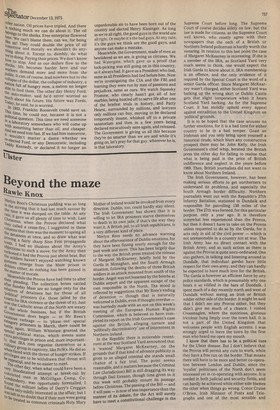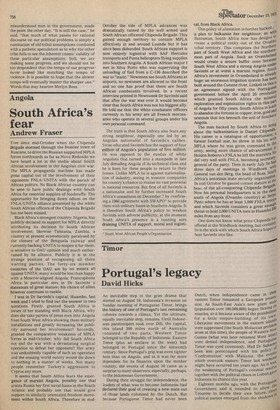Beyond the maze
Rawle Knox
Merlyn Rees's Christmas pudding was so long the stirring that it had lost much savour by r 'Ile time it was dumped on the table. At any r.a,te, it gave us all plenty of time to wish. Last th `-nristmas, when the Provos declared what ,C,13, ailed a cease-fire, I suggested in these I ealy rnns that then was the moment to spring all ne detainees at once, and so draw what was tPruving a fairly sharp Sinn Fein propaganda °nth. I had no illusions about the Army's ehlections to such a move, for the Army then rtrt°ned it had the Provos just about beat. But g e soldiers haven't enjoyed watching known dunjnen emerge from the Maze prison in 411°Iets either, so nothing has been gained in e Matter of morale. thM, eanwhile the Provos have had time to alter afte'r Pleading. The collection boxes rattled reier Sunday Mass are no longer only for the atives of detainees but for those of all 'political' Prisoners (i.e. those jailed by the cn°11rts for IRA violence or the threat of it). Just oftlw the Catholic areas of the North are weary (-1 the whole business, but if the British c,,_overninent does begin in Mr Rees's ea4utious verbiage — to 'phase out' special bnttegnrY prisoners in March, there could be s"`tle again. William wnitelaw granted the el)ercial political status, which means some Y 1,,,11.4 Privileges in prison and, more importantr loitbat ID A
men organise themselves as a e
whitarY group in captivity, like PoWs. He did so vi ptin faced with the threat of hunger strikes. If leges are to be withdrawn that threat will ",lepeateil, and be no easier to meet.
elite other day, when what could have been a
'C _v_ tY blodstained attempt at break-out by onvictoed men in McGilligan Camp, Co. foull.,,I,,"derrY, was opportunely forestalled, I Es-Cu.' the militant ladies of Derry's Creggan wasa.te °IllY•mildly interested in the affair; but I
left in no doubt that if their men were going ae treated as common criminals Holy Mary Mother of Ireland would be invoked from every direction. Dublin, too, could hardly stay silent. The Irish Government has shown that it is willing to let IRA prisoners starve themselves to death in its own jails, if that's the way they want it. A British jail, to all Irish republicans, is a very different kind of place. Merlyn Rees needs no advance warning about the effervescence of Dublin emotions, for they have been fizzing sourly enough for the past week and more. This has been largely due to the way the British press treated the release of Margaret McKearney, briefly held by the Garda in Monaghan, and the South Armagh situation, following the deaths of three British soldiers in an attack mounted from south of the border. Anger was not lessened by the bombs at Dublin airport and the apparent escape of the men responsible in the North. The mood is reflected by suggestions that Mr Rees's ending of detention — though that is naturally welcomed in Dublin, even if thought overdue — was hurriedly made with an eye on this week's meeting of the European Human Rights Commission, which is believed to have completed its report on the Irish Government's case against the British, alleging torture and 'politically discriminatory' use of internment in Northern Ireland. In the Republic there is noticeable resentment at the way Scotland Yard announced that it 'wanted' Margaret McK earn eY, on the grounds that if that kind of advance publicity is given to an alleged criminal she stands small chance of a fair trial. The point seems reasonable, and it matters because the Criminal Law (Jurisdiction) Bill is still dragging its way through Dail Eireann, though time given to it this week willl probably ensure its passage before Christmas. The passing of the Bill — and it will pass — is now of less importance than the manner of its debate, for the Act will surely have to meet a constitutional challenge in the
Supreme Court before long. The Supreme Court of course decides solely on law, but the law is made for citizens, as the Supreme Court well knows, who mostly agree with their newspapers that the oath of a British or Northern Ireland policeman is hardly worth the swearing. In relation to this last point the case of Margaret McKearney is interesting. If she is a member of the IRA, as Scotland Yard very much seems to think, one would expect the Irish Garda to know about it. IRA membership is an offence, and the only evidence of it required by the Special Court is the word of a senior Garda officer. Since Margaret McKearney wasn't charged, either Scotland Yard was barking up the wrong skirt or Dublin Castle gets that slight temperature when it hears Scotland Yard barking. As for the Supreme Court, it has stolidly upheld every appeal against extradition to the United Kingdom on 'political' grounds.
It is to be hoped that the case arouses no further emotions, for it is a bad time for either country to be in a bad temper. Goad an Irishman and you only bring upon yourself a historical tirade, which blurs any constructive prospect there may be. John Kelly, the Irish Government's chief whip, berated the British press the other day for failing to realise that what is being paid is the price of British indifference and neglect in the years before 1969. Then, British journalists did not want to know about Northern Ireland.
The Irish Government, however, has been making serious efforts to get northerners to understand its problems, and especially the South Armagh border difficulty. Northern journalists went out with the Republic's 27th Infantry Battalion, stationed in Dundalk and responsible for patrolling 130 miles of the border. The 27th was formed, for this particular purpose, only a year ago. It is therefore somewhat less experienced than the Provos, but then it doesn't have to take on the Provos unless requested to do so by the Garda, for it acts only in aid of the civil power — which is not unreasonable in a country not at war. The Irish Army has no direct contact with the British Army, and so such action as there is against the Provos is quite unco-ordinated. One also gathers, in talking and listening around in Dundalk, that individual gardai have little respect for their own army, and they can hardly be expected to have much love for the British.
The Garda is however an efficient force by any police standards, which is presumably why one hears it so vilified in the bars of Dundalk. I spent much of a day recently north and west of Dundalk without seeing an Irish or British soldier either side of the border. It might be said that I didn't see any Provos either, but they didn't give me much of a chance. I visited Crossmaglen, where the notorious, glorious tricolour hung limply over the town hall. It is not a part of the United Kingdom that welcomes people with English accents. I was strongly urged to leave the town by the first man who heard me open my mouth.
I know that there has to be a political cure for the Ulster disease. But I don't believe that the Provos will permit any cure to work, while they have a free run on the border. That means there will have to be more and better co-opera tion between London and Dublin, since the 'loyalist' politicians of the North don't seem interested yet in co-operating with anyone. It is needed in both judicial and security fields, and can hardly be achieved while either side blames the other when things go wrong. Conor Cruise O'Brien, Irish Minister of Posts and Telegraphs and one of the most sensible and misunderstood men in the government, made the point the other day. "It is still the case," he said, "that much of what passes for rational discourse on our political problems is simply a rumination of old tribal assumptions combined with a pathetic speculation as to why the other tribe fails to see the inherent cosmic validity of these particular assumptions. Still, we are making some progress, and we should not be too despondent that the tempo of our progress never looked like matching the tempo of violence. It is possible to hope that the slower tempo will eventually master the sharper one." Words that may hearten Merlyn Rees.


































 Previous page
Previous page